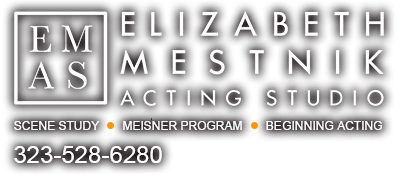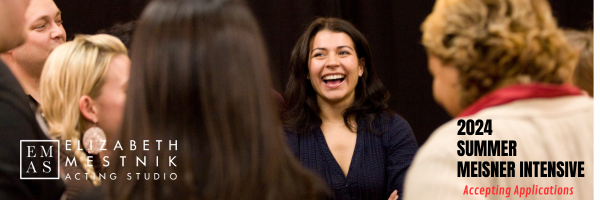What do we teach?
I’m asked all the time “What do you teach actors? What do you learn in a Meisner Technique program?” I mean truly, the skill sets required of actors are often not visible to the untrained eye, the best acting is invisible, it looks just like real life, so I am not surprised that the beginning acting student isn’t sure what it is they need to learn to become a truthful exciting actor. So I usually explain to them that we teach you how to be truthful in your acting, you learn how to act from your instincts and not your head, we fine tune your ability to be in true contact with another actor, how to tap into your imagination to emotionally connect to the dramatic circumstances of the script, you learn to sensitize to the world around you so you can walk in your character’s shoes with emotional truth and integrity…and at some point in this long list they interrupt and ask “how do you do that?” . And that is where it gets tricky, because as “simple” as the Meisner Technique’s structure is, it’s ramifications are profound and address so many of the actor’s needs – it’s difficult to sum it up in a brief conversation. The best way to understand the work is by reading one of the two great books on the process, -William Esper’s book “The Actor’s Art and Craft” or, of course, Sanford Meisner’s book “On Acting”. But these conversations have gotten me to thinking that maybe we could give people a skeletal understanding of the Meisner steps and what skills they address. I do this because it is important for us to understand that the skills actors need go way beyond memorizing lines and hitting your mark.
REPETITION EXERCISE:
The Repetition Exercise is the most well known phase of Meisner’s work and it lays a really important foundation for the more complex exercises and important scene work that comes down the road.
For me the Repetition exercise has 3 phases:
1. Objective Repetition without changes
2. Objective Repetition with changes
3. Subjective Repetition with changes
All of which develop the actor’s ability to work off of their partner, work impulsively and stand up for their own feelings. Here is how this little repetition exercise does all that.
The Objective Repetition without changes, starts with someone commenting on the first thing they see in their acting partner and then their partner repeating what they said and this repetition of the same observation goes on and on – it’s a simple but very powerful exercise that teaches actors
· How to honor their impulses by commenting on the first thing they notice- honoring what they really see before the sensors of politeness and manners set in. Contrary to mom’s advice we want you to speak before you think! We are teaching you to stop the judgment of your observations – so if the first thing they notice is “big nose” they have to say it! We are developing their ability to act from an impulse rather than their intellect, responding from the heart not the head. Just repeating also removes the need to come up with the words also helps keeps the student from thinking too much.
· How to put your focus and attention on one thing – their partner, and be able to read their partner’s behavior. In a time where we are always distracted, by an email, a phone call, a billboard, re-learning how to stay focused over time is an invaluable skill. Ultimately this is about connecting with another human being and allowing all other distractions to fall away so you can truly be present with someone else, truly be affected by them, and live in the moment. Learning to put your focus somewhere outside of oneself is also an invaluable tool to calm nerves.
· How to allow yourself to be affected by someone else and how to give your body and voice permission to reveal how you are feeling. We are trained in life not to show our weaknesses, our worry, our vulnerability and that can create a lot of tension that keeps the actor from being expressive. We are trained in life to show only our “best” selves, but as actors we must show our “true” selves. Sometimes students become robotic in this first step for fear of not doing it right. We don’t care about being right we care about behaving truthfully. We remove the idea of being right or wrong and substitute the idea of either being present or not to your partner and to the moment.
Repetition with changes. Now the actor is allowed to change the repetition when their partner inspires them to do so. It may be as simple as a fact “you scratched your nose”, or it may go deeper to “you are flirting with me”. At first whatever they notice and can put into words is valid. And when they can’t find the words, they continue to repeat. We want to make sure that they aren’t thinking before they speak and they aren’t intellectually searching for a way to change the repetition. It is better to just repeat than to intellectualize. This phase
· Furthers the actor’s ability to read behavior, and now makes the actor commit to calling the behavior, without polite editing. Removing the editor in one’s mind is an important aspect of getting actors to be instinctual and emotional.
· Enhances the impulsive response, which is not within the actor’s control. Controlling the changes in the repetition exercise means the actor is still working from their head and aren’t completely free.
· Is the beginning step of the actors finding their own point of view, of really taking in how someone is behaving and having an opinion about it.
Subjective Repetition With Changes. Now instead of calling the first thing they see in their partner to start off the exercise, the actor is prompted to put their point of view out there – to have the courage to have an opinion about what they see. This can be a very difficult step – as we have been taught from a very young age to avoid being completely truthful when in dialogue with someone else. We are taught not to say anything that might make someone uncomfortable, and so saying what we really think is tough – and hearing it and really taking it in is also very tough. I once had a young man say to a really beautiful young woman “you are gorgeous”. It was completely truthful and heartfelt, and this beautiful young woman was completely overwhelmed by the honesty and genuineness that she welled up with tears. Why? Because the safe space of the classroom allowed he to let go of her defenses and show her feelings and because we don’t get opportunities for this sincerity very often in real life! But I say in this work we are not looking to behave as we would in real life – we want to be MORE TRUTHFUL than we are in real life. That is why audiences pay money to see us, because we will reveal to them something BEYOND what they experience in the every day. So this phase continues to solidify working from the instinct, and staying connected with the partner, but it’s most profound work is that it
· Teaches us to look for the TRUTH in all our work.
So that is the REPETITION EXERCISE broken down as simply as I am able. It is such an invaluable foundation to truthful, spontaneous acting – but it is only the beginning. Next I’ll talk about the Independent Activity, Emotional Preparation, Scene Work, Relationships and Shared Circumstances exercises. However, none of these more advanced exercises are doable unless the actor is able to work off of their partner, honor their impulses and have a point of view, all skills that are learned in the Repetition Exercises.
If you would like more information on The Elizabeth Mestnik Acting Studio, please visit us on the web at
www.emasla.com
The Elizabeth Mestnik Acting Studio is the recommended training program for NBC’s Talent Development Program


 “Living truthfully in imaginary circumstances” – this is the best way to describe what the Meisner technique does for a professional actor. In the words of the students of Emasla, this is what the studio lives and breathes in its classes.
“Living truthfully in imaginary circumstances” – this is the best way to describe what the Meisner technique does for a professional actor. In the words of the students of Emasla, this is what the studio lives and breathes in its classes.






